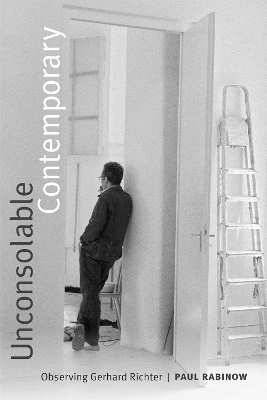
Unconsolable Contemporary
Observing Gerhard Richter
Seiten
2017
Duke University Press (Verlag)
978-0-8223-6996-7 (ISBN)
Duke University Press (Verlag)
978-0-8223-6996-7 (ISBN)
Paul Rabinow continues his explorations of "a philosophic anthropology of the contemporary" by examining the work of German painter Gerhard Richter. Defining the contemporary as a moving ratio in which the modern becomes historical, Rabinow uses Richter's work to illustrate how meaning is created within the contemporary.
In Unconsolable Contemporary Paul Rabinow continues his explorations of "a philosophic anthropology of the contemporary." Defining the contemporary as a moving ratio in which the modern becomes historical, Rabinow shows how an anthropological ethos of the contemporary can be realized by drawing on the work of art historians, cultural critics, social theorists, and others, thereby inventing a methodology he calls anthropological assemblage. He focuses on the work and persona of German painter Gerhard Richter, demonstrating how reflecting on Richter's work provides rich insights into the practices and stylization of what, following Aby Warburg, one might call "the afterlife of the modern." Rabinow opens with analyses of Richter's recent Birkenau exhibit: both the artwork and its critical framing. He then chronicles Richter's experiments in image-making as well as his subtle inclusion of art historical and critical discourses about the modern. This, Rabinow contends, enables Richter to signal his awareness of the stakes of such theorizing while refusing the positioning of his work by modernist critical theorists. In this innovative work, Rabinow elucidates the ways meaning is created within the contemporary.
In Unconsolable Contemporary Paul Rabinow continues his explorations of "a philosophic anthropology of the contemporary." Defining the contemporary as a moving ratio in which the modern becomes historical, Rabinow shows how an anthropological ethos of the contemporary can be realized by drawing on the work of art historians, cultural critics, social theorists, and others, thereby inventing a methodology he calls anthropological assemblage. He focuses on the work and persona of German painter Gerhard Richter, demonstrating how reflecting on Richter's work provides rich insights into the practices and stylization of what, following Aby Warburg, one might call "the afterlife of the modern." Rabinow opens with analyses of Richter's recent Birkenau exhibit: both the artwork and its critical framing. He then chronicles Richter's experiments in image-making as well as his subtle inclusion of art historical and critical discourses about the modern. This, Rabinow contends, enables Richter to signal his awareness of the stakes of such theorizing while refusing the positioning of his work by modernist critical theorists. In this innovative work, Rabinow elucidates the ways meaning is created within the contemporary.
Paul Rabinow is Professor of Anthropology at the University of California, Berkeley, and is the author and editor of numerous books, including Designs for an Anthropology of the Contemporary, also published by Duke University Press, and, most recently, Modes of Uncertainty: Anthropological Cases.
Introduction. Form and Birkenau 1
1. Object: The Contemporary 15
2. Constellations: Writing and Imaging Strife 33
3. Assembling: Abet and Facilitate 65
4. Composition: Technē and Pathos 95
5. Contemporary Consolations: Unconsoled 125
6. Restive Endings 141
Notes 147
Bibliography 159
| Erscheinungsdatum | 10.11.2017 |
|---|---|
| Verlagsort | North Carolina |
| Sprache | englisch |
| Maße | 152 x 229 mm |
| Gewicht | 408 g |
| Themenwelt | Kunst / Musik / Theater ► Kunstgeschichte / Kunststile |
| Kunst / Musik / Theater ► Malerei / Plastik | |
| Geisteswissenschaften ► Sprach- / Literaturwissenschaft ► Anglistik / Amerikanistik | |
| Sozialwissenschaften ► Ethnologie | |
| Sozialwissenschaften ► Soziologie | |
| ISBN-10 | 0-8223-6996-6 / 0822369966 |
| ISBN-13 | 978-0-8223-6996-7 / 9780822369967 |
| Zustand | Neuware |
| Haben Sie eine Frage zum Produkt? |
Mehr entdecken
aus dem Bereich
aus dem Bereich
Poetik eines sozialen Urteils
Buch | Hardcover (2023)
De Gruyter (Verlag)
59,95 €
Buch | Softcover (2024)
belleville (Verlag)
20,00 €


